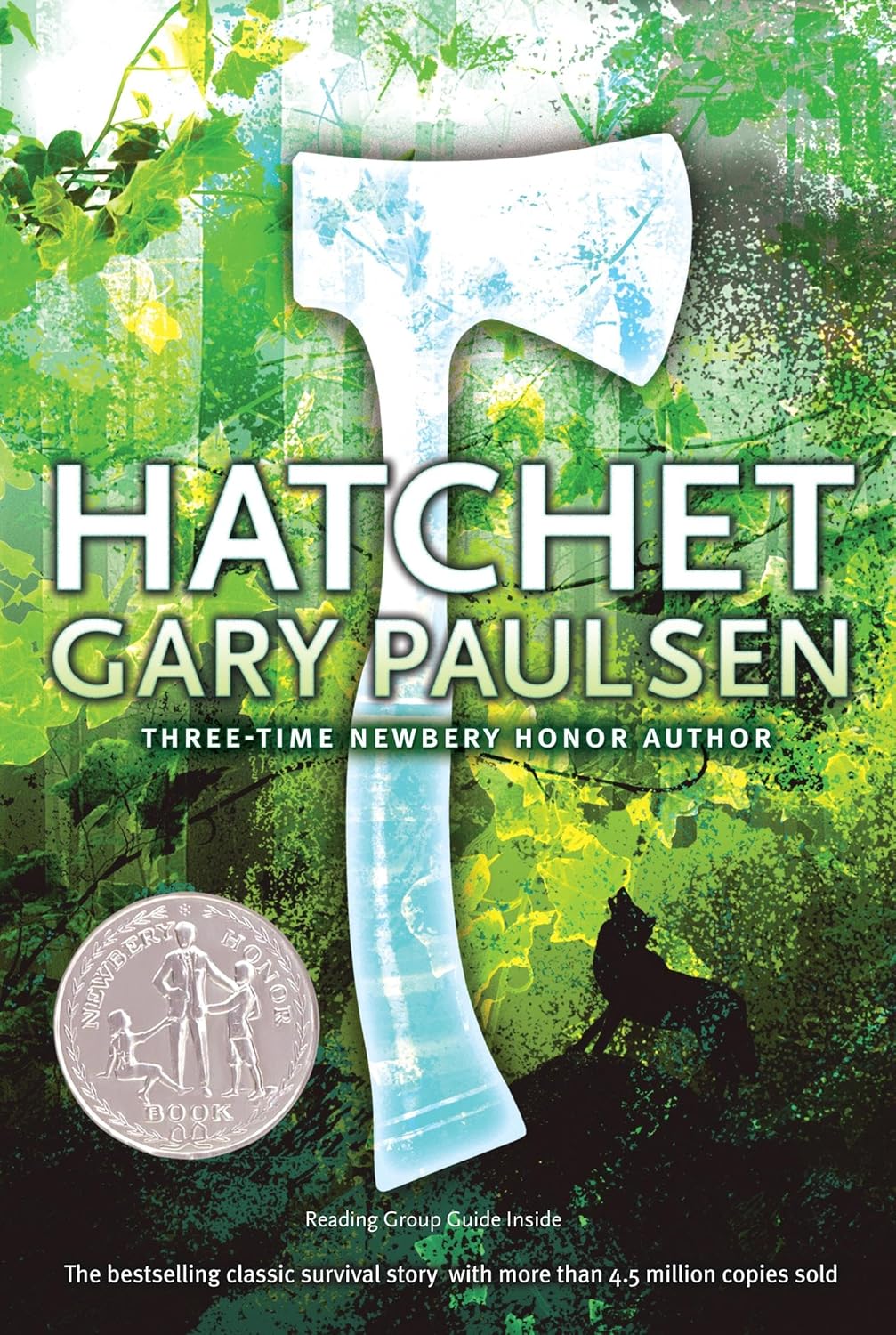Book Summary
In Hatchet, Gary Paulsen crafts a heart-pounding survival story about 13-year-old Brian Robeson, who becomes stranded in the Canadian wilderness after a plane crash. Armed with nothing but the hatchet his mother gave him, Brian must learn to hunt, build shelter, and make fire while battling hunger, wild animals, and his own despair. The novel vividly portrays his transformation from a scared city boy to a resourceful survivor, all while grappling with the emotional trauma of his parents’ recent divorce.
Paulsen’s writing immerses readers in Brian’s struggle through meticulous details about wilderness survival – from identifying edible berries to crafting fishing spears. While the premise seems simple, the execution is masterful, balancing tense action sequences with poignant moments of self-discovery. Some readers may find the repetitive phrasing distracting, but this stylistic choice effectively mirrors Brian’s obsessive thought patterns during isolation.
Key Themes
Self-Reliance and Resilience: Brian’s journey epitomizes the human capacity to adapt under extreme circumstances. Forced to rely solely on his wits, he progresses from helplessness to competence, symbolizing the universal coming-of-age experience. His mantra – “He would do it himself” – becomes the novel’s emotional core as he overcomes starvation, animal attacks, and even suicidal thoughts.
Nature as Both Threat and Teacher: The Canadian wilderness serves as antagonist and mentor. While dangers like moose attacks and tornadoes test Brian’s limits, nature also provides the resources and quiet reflection needed for growth. Paulsen contrasts modern society’s distractions with the wilderness’s raw honesty, suggesting true self-knowledge comes from direct engagement with the natural world.
What Makes It Unique
Uncompromising Realism: Unlike sanitized adventure stories, Hatchet doesn’t shy from brutal details – Brian suffers diarrhea from bad berries, gets sprayed by a skunk, and nearly dies from a moose attack. Paulsen’s own wilderness experiences lend authenticity to every survival technique, making Brian’s triumphs feel earned rather than contrived.
Psychological Depth in Simplicity: With minimal characters and no dialogue for long stretches, the novel achieves remarkable emotional complexity through Brian’s internal monologue. His alternating hope and despair, coupled with flashbacks about “The Secret” of his mother’s affair, create a nuanced portrait of adolescent trauma intersecting with physical survival.
Reader Reactions
Generations of readers have embraced Hatchet as their gateway to loving literature. Many recall it as “the first school-assigned book they actually enjoyed,” praising its relentless pacing and relatable protagonist. Parents appreciate how it sparks discussions about resilience, though some caution about intense scenes like the plane crash or Brian’s suicide attempt.
The book’s educational value is widely acknowledged, with teachers using it to explore survival skills and emotional intelligence. Some adult readers find Brian’s rapid skill acquisition unrealistic, while others argue it reflects children’s remarkable adaptability. The audiobook version, narrated by Peter Coyote, receives particular praise for enhancing the story’s immersive quality.
About the Author
Gary Paulsen (1939-2021) was a prolific American author who wrote over 200 books, primarily for young adults. His difficult childhood – marked by parental neglect and time spent alone in the woods – directly informed Hatchet‘s themes. Before writing, Paulsen worked as a trapper, sailor, and dogsled racer, even competing in the Iditarod. These experiences lent authenticity to his wilderness narratives.
Paulsen wrote Hatchet after surviving his own plane emergency in 1983. The novel won a Newbery Honor in 1988 and spawned four sequels exploring alternate survival scenarios for Brian. Paulsen often stated he aimed to “write books that make readers feel less alone,” a mission evident in Brian’s deeply personal yet universally resonant journey.
Memorable Quotes
“He would do it himself. He would find food, and water, and build a fire.” — Brian’s survival resolution
“There had been fire for thousands, millions of years. But he had never had it.” — On Brian’s first successful fire
“The difference between city and wilderness was that in the city, he could pretend nothing had changed.” — Brian reflecting on his parents’ divorce
